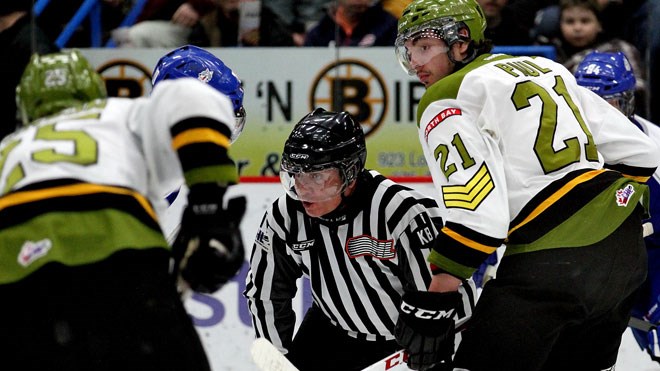It was a perception of the job that was forged at a relatively early age not long after Horner, just 16 years old, stepped in to work a junior B game in Garson after an official was injured.
"The older guys were very serious about their craft," said Horner. "If you weren't serious about it, they weren't ready to help you. If you were serious about it, they would bend over backwards for you."
Men like Bruce Killah and Art Connor shaped the early years as Horner grew as an official.
"I had to get better at feeling the game and communicating," he said. "Communication is a big part of being a linesman, too, because you're talking to the players all night long. It's non stop. And I grew to understand the commitment that was needed."
That dedication paved the way for Horner to work primarily in the OHL as a linesman, but to tackle the referee's role at a whole variety of other levels of hockey, something he continues to this day.
"I talked to a few people who suggested refereeing would make me a more complete official, help to open up a few doors," Horner explained.
Over time, the game would change, as would the role of the officials.
"You have to be in better shape, you have to be better prepared, mentally and physically, because the game is scrutinized to the nth degree today," said Horner. "But in some ways, the job is easier.
"The challenge, back in the day, before the rule changes, was that I often felt that we weren't officials, we were game managers, politicians, trying to pick and choose the penalties during the game.
"Now, the players are accountable for what they do, and if one team takes five penalties in a row, it is what it is."
As Horner worked his way through a second and third decade of officiating, special moments accompanied the journey.
They run the gamut: enjoying the chance to attend a pair of NHL officiating development camps; working the OHL All-Star game in Owen Sound; working games involving elite international competition and refereeing the gold medal game at the 2003 Telus Cup in Sault Ste Marie, an assignment that would see Horner donate his helmet and whistle to the Hockey Hall of Fame.
In later years, however, that focus changed.
"Realizing that my time has gone, my goal was to stay involved long enough to try and help open doors for other officials, to be part of that development of younger officials," Horner said.
That emphasis has proved equally rewarding for the 55-year-old Sudbury native. Having the chance to work with, provide input and still, to this day, serve as a sometimes mentor to the likes of Conrad Haché, Dave Brisebois, Scott Ferguson and a hosts of others is a role that brings a smile to his face.
He beams with pride when chatting about local officials who have moved on.
"You look at Conrad and Dave making it to the NHL," said Horner. "What makes them special is obviously their talent, to be able to get that far, but also the personality.
"If you're a good person, one that can be trained and can be taught, you have a better chance of being successful in this business."
Along with Dan McCourt, Horner was instrumental in helping create the opportunity for me and Todd Guthrie to work at the 2010 Winter Olympics in Vancouver.
"To sit back and watch the Olympics and see you and Todd doing the gold-medal game, it was like watching Dave Brisebois and Conrad Haché do their first NHL games," said Horner.
His 36 years in the OHL have been rewarding, though not without peril. Just three years back, Horner suffered a broken elbow that sidelined him for six months and leaves him still with three pins in his arm.
But many more are the moments he will miss.
"What I am going to miss most is the guys, the camaraderie, the pre-game stuff in the dressing room," he said.
The Friday night games will go on, but they too, will seem just a little bit different without the presence of — as Berk Keaney used to introduce him for decades — Douglas M. Horner.
Join Sudbury.com+
- Messages
- Post a Listing
- Your Listings
- Your Profile
- Your Subscriptions
- Your Likes
- Your Business
- Support Local News
- Payment History
Sudbury.com+ members
Already a +member?
Not a +member?
Sign up for a Sudbury.com+ account for instant access to upcoming contests, local offers, auctions and so much more.
